Ethics in assessment
Download as pptx, pdf6 likes32,111 views
The document discusses ethics in assessment and outlines four key points: 1. Learning outcomes related to ethics can be conceptualized in different ways, such as complementary, translation, or enabling orientations. 2. The assessment of ethics involves articulating learning outcomes and selecting appropriate assessment methods. 3. It also involves determining the basis for making judgements about students' achievement. 4. Finally, it involves considering students' role in the assessment process.
1 of 9
Downloaded 132 times
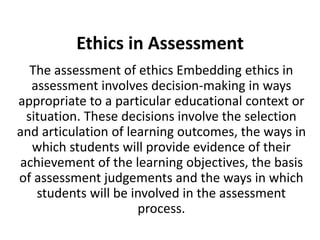
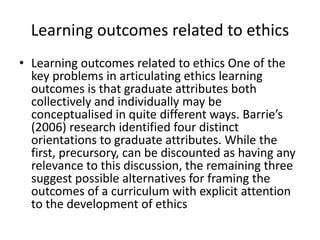
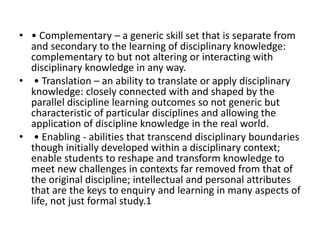
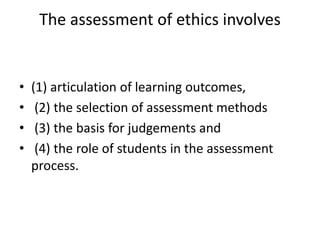
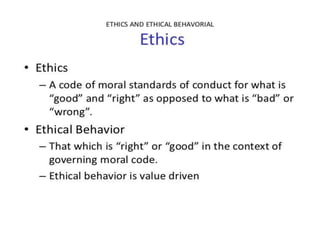
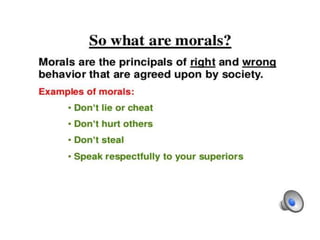
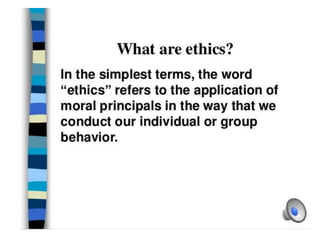
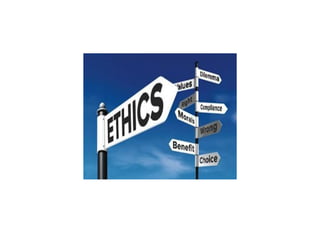
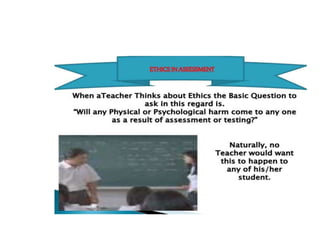
Ad
Recommended
Ethics in Assessment
Ethics in AssessmentPotterheadNove
╠²
There are some situations where assessment may not be appropriate:
1) Asking elementary students sensitive personal questions without parental consent.
2) Using tests to evaluate students' mental abilities when the validity and reliability of the instrument are unknown.
3) Requiring students to disclose private sexual fantasies.
The document also discusses ethical issues around assessment, including maintaining confidentiality of results, avoiding deception unless justified, and not assisting certain students during testing.Assessment lecture1
Assessment lecture1CD Balubayan
╠²
The document discusses various topics related to assessment of student learning, including:
1. It defines assessment as a process to obtain information about learning objectives or goals, and notes that testing is a special form of assessment conducted under controlled conditions.
2. It distinguishes between different types of assessment including formative assessment to guide instruction, summative assessment to evaluate learning, and diagnostic assessment to identify gaps.
3. It also discusses different scales of measurement used in educational assessment, including nominal, ordinal, interval, and ratio scales, and notes challenges in measuring intangible constructs.Assessment of learning Chapter 1
Assessment of learning Chapter 1Jarry Fuentes
╠²
The document discusses various topics related to educational assessment:
1. It defines different kinds of assessment including formative, summative, diagnostic, dynamic, and synoptic assessment.
2. It explains the functions of educational assessment including improving teaching and learning, demonstrating student success, and quantifying achievement.
3. It discusses principles of effective assessment such as starting with educational goals and standards, using assessment to improve learning, and employing multiple measures.
4. It outlines the assessment cycle including identifying goals, pre-assessing students, providing instruction, assessing outcomes, and using results to improve learning and instruction.Practicality and-efficiency
Practicality and-efficiencyJelma Perico
╠²
The document discusses practicality and efficiency as important factors for teacher assessments. Assessments should be familiar to teachers and easy to administer and score so they don't require too much time or resources. Multiple choice tests are efficient to score but time-consuming to create, while essay tests are quicker to make but longer to grade. Performance assessments take the most time. Assessments should also have simple instructions, accurate scoring methods, clear results, and low costs.Field-Study-2-Lecture-ECRE reviewer.pptx
Field-Study-2-Lecture-ECRE reviewer.pptxxeinyenmoon
╠²
This document provides an overview of Field Study 2 for teacher trainees. It discusses 18 learning episodes that cover topics like action research, developing effective learning environments, classroom management, and lesson planning. Specific strategies are presented for creating optimal classroom climate in both face-to-face and online settings. Key aspects of action research, learning environments, and the teacher development process are also summarized.Andersons/Blooms Revised Taxonomy
Andersons/Blooms Revised Taxonomysherberts
╠²
The document provides information about Bloom's revised taxonomy of learning domains including the six stages of thinking: remembering, understanding, applying, analyzing, evaluating, and creating. For each stage, examples are given of cognitive processes and potential classroom activities and products. Lower and higher order thinking questions are also discussed for each stage to encourage deeper engagement with content.Clarity of Learning Targets (Assessment)
Clarity of Learning Targets (Assessment)Ne Za
╠²
The document outlines learning outcomes categorized into cognitive, affective, and psychomotor domains, discussing various assessment methods for each. It highlights the importance of different levels of understanding, skills, products, and affect in the learning process, emphasizing authentic and performance assessments. Methods such as self-assessment, oral presentations, and rubrics are recommended to evaluate student competencies and attitudes.Properties of Assessment Method
Properties of Assessment MethodLarry Sultiz
╠²
This document discusses key properties that make assessments valid, reliable, fair, practical and ethical. It defines validity as the degree to which a test measures what it is intended to measure. There are several types of validity including content, criterion, predictive and construct validity. Reliability refers to an assessment producing stable and consistent results over time and is measured through inter-rater reliability, test-retest reliability and internal consistency. Fairness means students understand learning targets and the assessment method. Practicality means teachers are familiar with assessments and they are not overly complicated to implement. Ethics in assessment refers to ensuring tests are fair and conform to professional standards of conduct.Basic Concept in Assessment
Basic Concept in AssessmentJarry Fuentes
╠²
This document discusses assessment in education. It defines assessment as obtaining information about student performance and achievement. It discusses different types of assessment including formative assessment, summative assessment, and diagnostic assessment. It also discusses key concepts in educational assessment including measurement, evaluation, variables, indicators, and factors. Principles of good assessment practice and the assessment cycle are also summarized.Assessment of student learning 1
Assessment of student learning 1joeri Neri
╠²
The document discusses key concepts related to student assessment including:
1) It defines terms like assessment, evaluation, measurement, formative assessment, placement assessment, diagnostic assessment, and summative assessment.
2) It differentiates between assessment, testing, measurement, and evaluation.
3) It discusses the purposes of assessment and the roles of assessment in instructional decisions.
4) It compares different types of assessment like diagnostic versus placement, and norm-referenced versus criterion-referenced.
5) It provides details on specific assessment methods like portfolios, performances, and guidelines for effective student assessment.Types of Tests
Types of TestsIvy Autor
╠²
Traditional pen and paper tests can be used to measure students' knowledge in various ways. There are different types of tests including achievement tests, personality tests, mastery tests, and standardized tests. Tests can be constructed using various item formats such as multiple choice, essay, and matching questions. When developing a test, educators must consider test planning, construction, administration, and evaluation. The evaluation process includes analyzing item difficulty, effectiveness, and student responses to improve future assessments.Types of Grading and Reporting System
Types of Grading and Reporting System Cyra Mae Soreda
╠²
The document discusses various grading and reporting systems used in education including letter grades, pass/fail systems, criterion-referenced grading, and portfolios. It also covers conducting parent-teacher conferences to discuss student performance and components that make up a student's overall grade such as tests, quizzes, projects, participation, and behavior. Effective grading requires thoughtful professional judgment and should not be used as a weapon against students.Assessment of learning 1
Assessment of learning 1Roxanne Tiffany Dotillos
╠²
This document discusses educational assessment, including its purposes, principles, types, and methods of interpretation. Assessment is used to monitor student learning, evaluate teaching strategies and curriculum, and inform decisions to improve the educational process. It should be based on clear goals and standards, provide continuous feedback, and relate to what students are learning. Assessment data is gathered and analyzed to evaluate performance, identify strengths and weaknesses, and guide improvements.Curriculum approachers
Curriculum approachersCarl Richard Dagalea
╠²
The document discusses different approaches to curriculum development, including behavioral, managerial, systems, and humanistic approaches. The behavioral approach focuses on setting goals and objectives and measuring learning outcomes through changes in behavior. The managerial approach views the principal as the curriculum and instructional leader who manages various school operations. The systems approach examines how different parts of the educational system relate and influence each other. The humanistic approach places the learner at the center of curriculum development and emphasizes self-actualization, intrinsic motivation, and developing students' self-esteem.Types of Assessment Maximum and Typical performance
Types of Assessment Maximum and Typical performanceHadeeqaTanveer
╠²
The document discusses the concepts of maximum and typical performance, highlighting that maximum performance refers to an individual's best effort under standard conditions while typical performance represents normal behavior over time. It outlines the conditions needed for both types of performance assessment and emphasizes the importance of using multiple measures, such as tests and questionnaires, to gain a comprehensive understanding of an individual's abilities and personality traits. Managers and educators should recognize these distinctions in performance to better evaluate and support individuals in various contexts.Assessment of learning 1
Assessment of learning 1Janiceona
╠²
This document discusses key concepts related to assessment of learning. It defines assessment, measurement, evaluation and testing. It outlines different modes of assessment including traditional, performance, and portfolio assessments. It also discusses types of assessment processes such as diagnostic, formative and summative assessments. Principles of quality assessment are outlined including clarity, appropriateness, validity, reliability, fairness, and practicality. Different methods of developing tests are also discussed such as identifying objectives, determining test type, constructing items, and validating tests.The Nature of Performance-Based Assessment (Assessment of Learning 2)
The Nature of Performance-Based Assessment (Assessment of Learning 2)iamina
╠²
Performance-based assessment is an alternative form of assessment that evaluates students' demonstration of skills through tasks like projects, presentations, and experiments, rather than traditional tests. It has strengths like clearly identifying learning targets, allowing various approaches to evaluation, and engaging students in an authentic learning process. However, it also has weaknesses such as being time-consuming to develop, administer, and score, and not providing as many samples of student achievement compared to other assessment types. Overall, performance-based assessment integrates evaluation with instruction but can be difficult to implement reliably.Affective assessment
Affective assessmententizralen
╠²
This document discusses affective assessment, which covers behaviors in the affective domain related to attitudes, beliefs, and feelings. It defines various affective traits like attitude, interest, values, opinions, and self-concept. Two main methods for assessing affective learning outcomes are described: teacher observation and student self-reports. Teacher observation can be unstructured, with open-minded noting of behaviors, or structured using checklists or rating scales to record specific behaviors. Multiple assessments over time are recommended to accurately gauge affective traits as emotions can vary.Teacher as curricularist
Teacher as curricularistCris Capilayan
╠²
1. Teachers play a complex role that involves curriculum development, instruction, assessment, and facilitating learning. They are involved with curriculum throughout the entire school day.
2. Traditionally, those who developed curriculum theories were considered "curricularists", but the teacher's role is broader as they are responsible for knowing, writing, planning, implementing, evaluating, and innovating the curriculum.
3. As the first point of curriculum engagement for students, the classroom teacher deserves the label of "curricularist" as they must know the curriculum, write curriculum materials, plan curriculum, initiate new curricula, innovate the existing curriculum, implement it, and evaluate its effectiveness.Traditional assessment and non traditional assessment
Traditional assessment and non traditional assessmentJuniel ŌĆŗ Tumampos
╠²
Traditional assessments typically involve multiple choice, true/false, or matching questions and evaluate students through ranked scores and grades. They are reliable and easy to administer but encourage low-level thinking. Non-traditional assessments like performance and portfolio evaluations directly observe students' applied skills and require higher-order thinking. They integrate written and applied measures to demonstrate proficiency in real-world tasks and emphasize cooperation over competition. While traditional tests enhance learning through understanding, non-traditional assessments enhance learning by requiring students to communicate interconnections among concepts and procedures.Grading and reporting
Grading and reportingReynel Dan
╠²
The document discusses various grading and reporting systems used in education. It describes the objectives of grading systems as providing results to students, parents, and administrators in a brief and understandable way. Various types of systems are examined, including traditional letter grades, pass-fail, checklists of objectives, letters to parents, portfolios, and parent-teacher conferences. Guidelines are provided for developing effective grading systems and conducting productive parent-teacher meetings.Foundations of curriculum
Foundations of curriculumApril Gealene Alera
╠²
The document discusses different types of curriculum:
1. Recommended curriculum refers to curricula proposed by scholars and organizations.
2. Written curriculum includes documents and syllabi created by curriculum experts and teachers for implementation.
3. Taught curriculum is what is actually taught in classrooms which may differ from the written curriculum. Additional factors like available resources are considered.Function of Grading and Reporting System
Function of Grading and Reporting SystemCyra Mae Soreda
╠²
The document discusses the grading and reporting systems used in education. It defines grading as applying standardized measurements of achievement levels in a course, while reporting is presenting conclusions and recommendations on matters referred. Grading and reporting systems are used to enhance student learning, inform parents of student progress, and help administration with promotion decisions, reporting to other schools/employers, and counseling. The document cautions that while grades themselves are not bad, it is their misuse and misinterpretation that can be problematic.Completion type of test
Completion type of testubariel
╠²
The document discusses guidelines for constructing and scoring completion and essay type tests. It provides examples of completion tests involving filling in blanks with words, letters, or phrases. Essay tests are described as allowing for assessment of higher-order thinking by requiring students to organize their thoughts in writing. The document outlines objectives, types, and rules for scoring essays, including specifying criteria, maintaining anonymity, and having multiple graders to reduce bias.Characteristics of 21st Century Assessment
Characteristics of 21st Century AssessmentSarah Mae Moniva
╠²
The document discusses the key characteristics of 21st century assessment:
1) Assessments should be responsive, flexible, and integrated into daily instruction rather than isolated events.
2) Assessments need to be informative, using clear goals and exemplars to guide student learning.
3) A variety of assessment methods should be used to accommodate all students and communicate results to stakeholders.Types of Test
Types of Test jasper gaboc
╠²
This document discusses different ways to categorize tests, including by mode of response (oral, written, performance), ease of quantification of responses (objective vs. subjective), mode of administration (individual vs. group), test constructor (standardized vs. unstandardized), and mode of interpreting results (norm-referenced vs. criterion-referenced). Tests can be categorized based on whether responses are oral, written, or performance-based. Objective tests with quantifiable responses can be compared to yield scores, while subjective tests allow divergent answers like essays. Tests are also categorized by whether they are administered to individuals or groups, and whether they are standardized with established procedures or unstandardized for classroom use.Implementing a Curriculum Daily in the Classrooms
Implementing a Curriculum Daily in the ClassroomsRizza Lynn Labastida
╠²
The document discusses guidelines for developing lesson plans for teachers. It states that teachers with less than 2 years of experience must prepare detailed daily lesson plans, while more experienced teachers can prepare less detailed daily lesson logs. It then outlines the main components that should be included in a lesson plan: objectives, subject matter, procedures, assessment, and assignment. The document also discusses Bloom's taxonomy and revised Bloom's taxonomy, providing examples of learning objectives for each level of thinking. It provides tips for teaching students with different learning styles like visual, auditory, and kinesthetic learners. Finally, it discusses guidelines for selecting appropriate instructional materials based on the cone of learning theory.Curriculum Essentials
Curriculum EssentialsIvy Rose Recierdo
╠²
This document discusses curriculum in schools. It defines curriculum as the lessons and academic content taught in a school. It outlines the different levels of education (elementary, high school, technical/vocational, higher) and the types of curricula (recommended, written, taught, supported, assessed, learned, hidden). It emphasizes that the teacher plays a key role as a curricularist - knowing the curriculum, writing it, planning it, initiating new curriculum, innovating it, implementing it, and evaluating it. The teacher's influence on students and the curriculum extends far beyond the classroom.What is Ethics an introduction to Ethics
What is Ethics an introduction to EthicsMasahiroNagasawa1
╠²
You'll have the introduction about ethics Cloud, michelle implementing postmodernistic strategies
Cloud, michelle implementing postmodernistic strategiesWilliam Kritsonis
╠²
This document discusses recommendations for improving ethical conduct in public education by implementing strategies from William Allan Kritsonis' "Ways of Knowing Through the Realms of Meaning". It begins by explaining Kritsonis' six realms of meaning: symbolics, empirics, aesthetics, synnoetics, ethics, and synoptics. It then focuses on the ethics realm and provides 10 recommendations to guide educational leaders, including establishing clear guidelines for ethical conduct, monitoring the organization, and modeling ethical behavior. Instructional practices can also be improved by incorporating ethics lessons and discussions. Overall, the document aims to illustrate how Kritsonis' framework can enhance ethical conduct in schools.More Related Content
What's hot (20)
Basic Concept in Assessment
Basic Concept in AssessmentJarry Fuentes
╠²
This document discusses assessment in education. It defines assessment as obtaining information about student performance and achievement. It discusses different types of assessment including formative assessment, summative assessment, and diagnostic assessment. It also discusses key concepts in educational assessment including measurement, evaluation, variables, indicators, and factors. Principles of good assessment practice and the assessment cycle are also summarized.Assessment of student learning 1
Assessment of student learning 1joeri Neri
╠²
The document discusses key concepts related to student assessment including:
1) It defines terms like assessment, evaluation, measurement, formative assessment, placement assessment, diagnostic assessment, and summative assessment.
2) It differentiates between assessment, testing, measurement, and evaluation.
3) It discusses the purposes of assessment and the roles of assessment in instructional decisions.
4) It compares different types of assessment like diagnostic versus placement, and norm-referenced versus criterion-referenced.
5) It provides details on specific assessment methods like portfolios, performances, and guidelines for effective student assessment.Types of Tests
Types of TestsIvy Autor
╠²
Traditional pen and paper tests can be used to measure students' knowledge in various ways. There are different types of tests including achievement tests, personality tests, mastery tests, and standardized tests. Tests can be constructed using various item formats such as multiple choice, essay, and matching questions. When developing a test, educators must consider test planning, construction, administration, and evaluation. The evaluation process includes analyzing item difficulty, effectiveness, and student responses to improve future assessments.Types of Grading and Reporting System
Types of Grading and Reporting System Cyra Mae Soreda
╠²
The document discusses various grading and reporting systems used in education including letter grades, pass/fail systems, criterion-referenced grading, and portfolios. It also covers conducting parent-teacher conferences to discuss student performance and components that make up a student's overall grade such as tests, quizzes, projects, participation, and behavior. Effective grading requires thoughtful professional judgment and should not be used as a weapon against students.Assessment of learning 1
Assessment of learning 1Roxanne Tiffany Dotillos
╠²
This document discusses educational assessment, including its purposes, principles, types, and methods of interpretation. Assessment is used to monitor student learning, evaluate teaching strategies and curriculum, and inform decisions to improve the educational process. It should be based on clear goals and standards, provide continuous feedback, and relate to what students are learning. Assessment data is gathered and analyzed to evaluate performance, identify strengths and weaknesses, and guide improvements.Curriculum approachers
Curriculum approachersCarl Richard Dagalea
╠²
The document discusses different approaches to curriculum development, including behavioral, managerial, systems, and humanistic approaches. The behavioral approach focuses on setting goals and objectives and measuring learning outcomes through changes in behavior. The managerial approach views the principal as the curriculum and instructional leader who manages various school operations. The systems approach examines how different parts of the educational system relate and influence each other. The humanistic approach places the learner at the center of curriculum development and emphasizes self-actualization, intrinsic motivation, and developing students' self-esteem.Types of Assessment Maximum and Typical performance
Types of Assessment Maximum and Typical performanceHadeeqaTanveer
╠²
The document discusses the concepts of maximum and typical performance, highlighting that maximum performance refers to an individual's best effort under standard conditions while typical performance represents normal behavior over time. It outlines the conditions needed for both types of performance assessment and emphasizes the importance of using multiple measures, such as tests and questionnaires, to gain a comprehensive understanding of an individual's abilities and personality traits. Managers and educators should recognize these distinctions in performance to better evaluate and support individuals in various contexts.Assessment of learning 1
Assessment of learning 1Janiceona
╠²
This document discusses key concepts related to assessment of learning. It defines assessment, measurement, evaluation and testing. It outlines different modes of assessment including traditional, performance, and portfolio assessments. It also discusses types of assessment processes such as diagnostic, formative and summative assessments. Principles of quality assessment are outlined including clarity, appropriateness, validity, reliability, fairness, and practicality. Different methods of developing tests are also discussed such as identifying objectives, determining test type, constructing items, and validating tests.The Nature of Performance-Based Assessment (Assessment of Learning 2)
The Nature of Performance-Based Assessment (Assessment of Learning 2)iamina
╠²
Performance-based assessment is an alternative form of assessment that evaluates students' demonstration of skills through tasks like projects, presentations, and experiments, rather than traditional tests. It has strengths like clearly identifying learning targets, allowing various approaches to evaluation, and engaging students in an authentic learning process. However, it also has weaknesses such as being time-consuming to develop, administer, and score, and not providing as many samples of student achievement compared to other assessment types. Overall, performance-based assessment integrates evaluation with instruction but can be difficult to implement reliably.Affective assessment
Affective assessmententizralen
╠²
This document discusses affective assessment, which covers behaviors in the affective domain related to attitudes, beliefs, and feelings. It defines various affective traits like attitude, interest, values, opinions, and self-concept. Two main methods for assessing affective learning outcomes are described: teacher observation and student self-reports. Teacher observation can be unstructured, with open-minded noting of behaviors, or structured using checklists or rating scales to record specific behaviors. Multiple assessments over time are recommended to accurately gauge affective traits as emotions can vary.Teacher as curricularist
Teacher as curricularistCris Capilayan
╠²
1. Teachers play a complex role that involves curriculum development, instruction, assessment, and facilitating learning. They are involved with curriculum throughout the entire school day.
2. Traditionally, those who developed curriculum theories were considered "curricularists", but the teacher's role is broader as they are responsible for knowing, writing, planning, implementing, evaluating, and innovating the curriculum.
3. As the first point of curriculum engagement for students, the classroom teacher deserves the label of "curricularist" as they must know the curriculum, write curriculum materials, plan curriculum, initiate new curricula, innovate the existing curriculum, implement it, and evaluate its effectiveness.Traditional assessment and non traditional assessment
Traditional assessment and non traditional assessmentJuniel ŌĆŗ Tumampos
╠²
Traditional assessments typically involve multiple choice, true/false, or matching questions and evaluate students through ranked scores and grades. They are reliable and easy to administer but encourage low-level thinking. Non-traditional assessments like performance and portfolio evaluations directly observe students' applied skills and require higher-order thinking. They integrate written and applied measures to demonstrate proficiency in real-world tasks and emphasize cooperation over competition. While traditional tests enhance learning through understanding, non-traditional assessments enhance learning by requiring students to communicate interconnections among concepts and procedures.Grading and reporting
Grading and reportingReynel Dan
╠²
The document discusses various grading and reporting systems used in education. It describes the objectives of grading systems as providing results to students, parents, and administrators in a brief and understandable way. Various types of systems are examined, including traditional letter grades, pass-fail, checklists of objectives, letters to parents, portfolios, and parent-teacher conferences. Guidelines are provided for developing effective grading systems and conducting productive parent-teacher meetings.Foundations of curriculum
Foundations of curriculumApril Gealene Alera
╠²
The document discusses different types of curriculum:
1. Recommended curriculum refers to curricula proposed by scholars and organizations.
2. Written curriculum includes documents and syllabi created by curriculum experts and teachers for implementation.
3. Taught curriculum is what is actually taught in classrooms which may differ from the written curriculum. Additional factors like available resources are considered.Function of Grading and Reporting System
Function of Grading and Reporting SystemCyra Mae Soreda
╠²
The document discusses the grading and reporting systems used in education. It defines grading as applying standardized measurements of achievement levels in a course, while reporting is presenting conclusions and recommendations on matters referred. Grading and reporting systems are used to enhance student learning, inform parents of student progress, and help administration with promotion decisions, reporting to other schools/employers, and counseling. The document cautions that while grades themselves are not bad, it is their misuse and misinterpretation that can be problematic.Completion type of test
Completion type of testubariel
╠²
The document discusses guidelines for constructing and scoring completion and essay type tests. It provides examples of completion tests involving filling in blanks with words, letters, or phrases. Essay tests are described as allowing for assessment of higher-order thinking by requiring students to organize their thoughts in writing. The document outlines objectives, types, and rules for scoring essays, including specifying criteria, maintaining anonymity, and having multiple graders to reduce bias.Characteristics of 21st Century Assessment
Characteristics of 21st Century AssessmentSarah Mae Moniva
╠²
The document discusses the key characteristics of 21st century assessment:
1) Assessments should be responsive, flexible, and integrated into daily instruction rather than isolated events.
2) Assessments need to be informative, using clear goals and exemplars to guide student learning.
3) A variety of assessment methods should be used to accommodate all students and communicate results to stakeholders.Types of Test
Types of Test jasper gaboc
╠²
This document discusses different ways to categorize tests, including by mode of response (oral, written, performance), ease of quantification of responses (objective vs. subjective), mode of administration (individual vs. group), test constructor (standardized vs. unstandardized), and mode of interpreting results (norm-referenced vs. criterion-referenced). Tests can be categorized based on whether responses are oral, written, or performance-based. Objective tests with quantifiable responses can be compared to yield scores, while subjective tests allow divergent answers like essays. Tests are also categorized by whether they are administered to individuals or groups, and whether they are standardized with established procedures or unstandardized for classroom use.Implementing a Curriculum Daily in the Classrooms
Implementing a Curriculum Daily in the ClassroomsRizza Lynn Labastida
╠²
The document discusses guidelines for developing lesson plans for teachers. It states that teachers with less than 2 years of experience must prepare detailed daily lesson plans, while more experienced teachers can prepare less detailed daily lesson logs. It then outlines the main components that should be included in a lesson plan: objectives, subject matter, procedures, assessment, and assignment. The document also discusses Bloom's taxonomy and revised Bloom's taxonomy, providing examples of learning objectives for each level of thinking. It provides tips for teaching students with different learning styles like visual, auditory, and kinesthetic learners. Finally, it discusses guidelines for selecting appropriate instructional materials based on the cone of learning theory.Curriculum Essentials
Curriculum EssentialsIvy Rose Recierdo
╠²
This document discusses curriculum in schools. It defines curriculum as the lessons and academic content taught in a school. It outlines the different levels of education (elementary, high school, technical/vocational, higher) and the types of curricula (recommended, written, taught, supported, assessed, learned, hidden). It emphasizes that the teacher plays a key role as a curricularist - knowing the curriculum, writing it, planning it, initiating new curriculum, innovating it, implementing it, and evaluating it. The teacher's influence on students and the curriculum extends far beyond the classroom.Similar to Ethics in assessment (20)
What is Ethics an introduction to Ethics
What is Ethics an introduction to EthicsMasahiroNagasawa1
╠²
You'll have the introduction about ethics Cloud, michelle implementing postmodernistic strategies
Cloud, michelle implementing postmodernistic strategiesWilliam Kritsonis
╠²
This document discusses recommendations for improving ethical conduct in public education by implementing strategies from William Allan Kritsonis' "Ways of Knowing Through the Realms of Meaning". It begins by explaining Kritsonis' six realms of meaning: symbolics, empirics, aesthetics, synnoetics, ethics, and synoptics. It then focuses on the ethics realm and provides 10 recommendations to guide educational leaders, including establishing clear guidelines for ethical conduct, monitoring the organization, and modeling ethical behavior. Instructional practices can also be improved by incorporating ethics lessons and discussions. Overall, the document aims to illustrate how Kritsonis' framework can enhance ethical conduct in schools.Ethics
EthicsDanielDeGuzman23
╠²
This document provides an overview of ethics including key concepts and theories. It defines ethics as the rational reflection on moral values and principles that determine right and wrong human behavior. It discusses several ethical principles and the origins of ethics from ancient Greek philosophers to modern thinkers. It also outlines different types of ethics including meta-ethics, descriptive ethics, normative ethics, and applied ethics. Additionally, it covers the evolution of ethics and its relationship to science. The document clarifies differences between ethics and morals as well as descriptive and normative ethics. It also defines important ethical concepts like moral issues, decisions, judgments and dilemmas. Finally, it discusses potential sources of ethical authority including law, religion, culture, and principles/theoriesTowards A Classification Of Metaphor Use
Towards A Classification Of Metaphor UseDominik Lukes
╠²
The document outlines a rationale for classifying metaphor use and proposes a classification system. It discusses problems with existing conceptual systems for classifying metaphor and outlines criteria such as recoverability, cognitive status, interpersonal purpose, and textual use. The classification aims to help with interpreting metaphor use in corpora and analyzing the conceptual underpinnings of texts, though it may be time-consuming to apply and imprecise.QUALITIES OF GOod research instrument-WPS Office.pptx
QUALITIES OF GOod research instrument-WPS Office.pptxCheriesAnnMorales
╠²
The document outlines the essential qualities of good test instruments, emphasizing validity, reliability, fairness, and ethical considerations. It details approaches to assessing validity and reliability, describes the importance of unbiased assessments, and highlights the role of positive consequences and punctuality in the testing process. Additionally, it addresses the need for ethics in assessment, including accommodating special needs and ensuring fairness in evaluation.Creative and critical approaches to teaching students to think ethically: phr...
Creative and critical approaches to teaching students to think ethically: phr...The Higher Education Academy
╠²
The presentation discusses the distinction between teaching ethics as a subject and fostering students' capacity to think ethically, emphasizing the need for critical pedagogy. It explores various methods such as scenarios and hypotheticals aimed at encouraging students to engage with ethical dilemmas and develop their judgment skills. Ultimately, it highlights the importance of process over knowledge in ethical deliberation, advocating for a curriculum that nurtures ethical thinking while reflecting on the broader implications of teaching ethics.Ethics
EthicsJB Ochieng Investments Ltd
╠²
This document discusses the relationship between critical thinking, philosophical anthropology, and principles of ethics. It argues that ethics education should have a theoretical base in these three areas. Critical thinking skills are important for ethical decision making by allowing one to question assumptions and consider alternative perspectives. Philosophical anthropology studies fundamental questions about human nature and existence that impact ethical views. Ethics is premised on understanding philosophical anthropology, and critical thinking can facilitate understanding different concepts and viewpoints related to ethics. Codes of ethics should not just be taught as rules but also explain the underlying principles.Reason And Professional Ethics Peter Davsongalle
Reason And Professional Ethics Peter Davsongallecioccifoehr
╠²
Reason And Professional Ethics Peter Davsongalle
Reason And Professional Ethics Peter Davsongalle
Reason And Professional Ethics Peter DavsongalleLegal ethics at the academic stage
Legal ethics at the academic stageUK Centre for Legal Education
╠²
The document discusses approaches to teaching legal ethics in law school curriculums. It proposes integrating ethics learning objectives throughout multiple core courses (a "vertical subject" approach). Specific ethics topics and scenarios would be discussed within the context of each course. This allows students to deepen their ethics knowledge as they progress. Later courses like a legal practice capstone can draw together ethics lessons from earlier courses. Experiential learning like clinics and problem-solving workshops are preferred over lectures for effectively facilitating ethics learning.Deliberative Asssessment with E-Portfolios
Deliberative Asssessment with E-Portfoliosdcambrid
╠²
The document discusses deliberative assessment through e-portfolios, emphasizing the importance of diverse student reflections and evidence of learning to inform educational practices. It explores how assessment can facilitate collective decision-making and enhance stakeholder engagement in learning contexts. Additionally, it highlights the complexities of measuring soft skills like ethics and leadership through portfolios, suggesting a need for evidence-based methods that capture the multifaceted nature of student competencies.Why ethics?
Why ethics?Robert Farrow
╠²
The document discusses the importance of ethics in various contexts, particularly in research and education, emphasizing the historical development of research ethics after World War II. It details principles of ethical intervention, the necessity for constant ethical consideration in research practices, and the increased moral obligations in the realm of open education due to technological advancements. Additionally, it outlines different philosophical approaches to ethics and concludes with the assertion that being ethical is unavoidable in research contexts, requiring rigorous ethical standards and engagement.Ed499325
Ed499325Lisa Shannon
╠²
This document discusses principles for ethical school leadership and decision-making grounded in William Allan Kritsonis' six realms of meaning. It provides 10 principles for principals: 1) Use inquiry and facts to recognize ethical issues and solutions; 2) Commit to a clear moral code; 3) Communicate using ethics vocabulary; 4) Use visuals to aid understanding; 5) Involve and empathize with stakeholders; 6) Apply fair approaches consistently and reflect on decisions. The principles are meant to guide principals in ethical decision-making and continuous improvement through reflection.VALUES & ETHICS
VALUES & ETHICSTuman Dewangan
╠²
Ethics is concerned with how people determine what is right and wrong in how they live their lives. There are several branches of ethics: meta-ethics examines the meaning of ethical concepts like good and bad; normative ethics examines standards for determining right and wrong action; and descriptive ethics studies people's beliefs about morality. Values help determine the importance or degree of significance of actions and ways of living. Ethics provides moral principles to determine right and wrong, while values motivate by indicating what is important to achieve. Ethics is important for building a just society and maintaining organizations and professions.Ecuador's education problems By Luis Coyago
Ecuador's education problems By Luis CoyagoLuiscn24
╠²
This document discusses professional ethics in education. It defines ethics as the philosophical study of morality and moral behavior in society. Professional ethics refers to the values, morality, and good judgment that promote desirable behaviors in a profession. For educators, professional ethics is important as the profession has a social purpose to properly serve the needs of society. The document outlines several ethical principles for educators, including consistency, freedom, and fairness. It also discusses essential requirements for properly exercising a profession, as well as potential problems that can arise when professional ethics are not followed, such as a loss of prestige and public trust in the profession. The document concludes by outlining characteristics of good teachers in relation to professional ethics.Authentic Assessment: Bridging Knowledge and Real-World Application
Authentic Assessment: Bridging Knowledge and Real-World Applicationjshanebernantepolest
╠²
This document presents a comprehensive overview of authentic assessment, emphasizing its role in evaluating students through real-world tasks that demonstrate the meaningful application of knowledge and skills. It compares traditional and authentic assessments, introduces non-test assessment methods, and highlights the importance of transversal competencies and 21st-century skills. Drawing from educational theorists and DepEd guidelines, it offers practical frameworks such as GRASPS and outlines essential features and guidelines for implementing effective performance-based assessments in contemporary classrooms.
Ethics of activity
Ethics of activitySafdarAli782850
╠²
This document discusses the importance of teaching ethics to students. It begins by defining ethics and explaining that ethics involve determining moral standards for behavior. While ethical views can differ depending on culture and beliefs, teaching ethics to students focuses on evaluating ethical standards and responding to violations. Studying ethics allows students to critically think about different opinions and perspectives in a safe environment before making real-world decisions. It then outlines different types of ethics, including metaethics (the nature of morality), normative ethics (theories of right and wrong behavior), and applied ethics (analysis of specific moral issues). The document emphasizes that teaching ethics is important as it exposes students to new viewpoints, develops critical thinking skills, and prepares them for success after graduation byEthics[2]
Ethics[2]guest2b32b2e
╠²
The document discusses several key aspects of ethical decision making and leadership in education. It emphasizes building trust through open communication, developing interpersonal skills to communicate effectively with all stakeholders, and creating an environment of care. It also stresses the importance of having codes of ethics to guide behavior, maintaining confidentiality and integrity, and avoiding unjustified favoritism to prevent dissension.1 Week 3 ŌĆō The impact of personal and cultural
1 Week 3 ŌĆō The impact of personal and cultural VannaJoy20
╠²
The document explores the impact of personal and cultural values in educational contexts, emphasizing that educators must reflect on their own values to effectively teach and influence their students. It discusses how both individual beliefs and broader cultural values shape educational practices and the moral development of students. The text further raises questions about the significance of reflective practices in enhancing human flourishing and the relationship between teaching, ethics, and personal growth.UNIT- I Human values.pptx
UNIT- I Human values.pptxSivakumarG52
╠²
This document discusses key concepts related to professional ethics in engineering including human values, morals, ethics, virtues, integrity, and work ethics. It defines these terms and discusses how they relate to each other. Some main points made are:
- Human values like honesty, fairness and care form the foundation for society. They are taught through families, schools and communities.
- Morals concern principles of right and wrong behavior based on lessons learned. Ethics deal with how moral values guide actions, especially professionally.
- Virtues are desirable character traits like honesty and compassion. Civic virtues involve moral duties and rights as a citizen.
- Integrity means adhering to a moral code and being true to oneCreative and critical approaches to teaching students to think ethically: phr...
Creative and critical approaches to teaching students to think ethically: phr...The Higher Education Academy
╠²
Ad
Ethics in assessment
- 1. Ethics in Assessment The assessment of ethics Embedding ethics in assessment involves decision-making in ways appropriate to a particular educational context or situation. These decisions involve the selection and articulation of learning outcomes, the ways in which students will provide evidence of their achievement of the learning objectives, the basis of assessment judgements and the ways in which students will be involved in the assessment process.
- 2. Learning outcomes related to ethics ŌĆó Learning outcomes related to ethics One of the key problems in articulating ethics learning outcomes is that graduate attributes both collectively and individually may be conceptualised in quite different ways. BarrieŌĆÖs (2006) research identified four distinct orientations to graduate attributes. While the first, precursory, can be discounted as having any relevance to this discussion, the remaining three suggest possible alternatives for framing the outcomes of a curriculum with explicit attention to the development of ethics
- 3. ŌĆó ŌĆó Complementary ŌĆō a generic skill set that is separate from and secondary to the learning of disciplinary knowledge: complementary to but not altering or interacting with disciplinary knowledge in any way. ŌĆó ŌĆó Translation ŌĆō an ability to translate or apply disciplinary knowledge: closely connected with and shaped by the parallel discipline learning outcomes so not generic but characteristic of particular disciplines and allowing the application of discipline knowledge in the real world. ŌĆó ŌĆó Enabling - abilities that transcend disciplinary boundaries though initially developed within a disciplinary context; enable students to reshape and transform knowledge to meet new challenges in contexts far removed from that of the original discipline; intellectual and personal attributes that are the keys to enquiry and learning in many aspects of life, not just formal study.1
- 4. The assessment of ethics involves ŌĆó (1) articulation of learning outcomes, ŌĆó (2) the selection of assessment methods ŌĆó (3) the basis for judgements and ŌĆó (4) the role of students in the assessment process.
